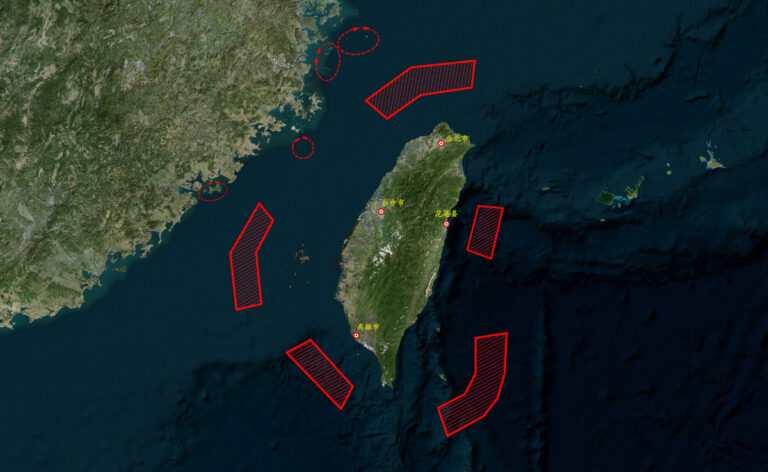The People’s Liberation Army launched large-scale joint military drills around Taiwan on Thursday after Taiwan’s President Lai Ching-te highlighted Chinese incursions and military threats in his inaugural address on Monday.
Meanwhile, proposed amendments to the Legislative Yuan to curtail the powers of Lai’s government have sparked a political fight this week, with some critics saying Beijing wants to exhaust Lai in the legislative battle and thwart his push for “Taiwan independence.”
The People’s Liberation Army’s Eastern Theater Command said in a statement that the two-day joint military exercise began around Taiwan island on Thursday morning.
The exercise, called “United Sword 2024A,” is being conducted in the Taiwan Strait (including around Kinmen, Matsu, Wuqi and Dongyin islands) and to the north, south and east of Taiwan Island.
Chie Chong, a researcher at the Taipei-based Institute for Strategic Foresight, told Taiwan’s Central News Agency that, given the code name and the use of the letter “A,” the PLA’s latest exercise could open the door to potential further exercises later this year.
He said the inclusion of Taiwan’s outlying islands in the nine designated locations for the People’s Liberation Army exercises for the first time in recent years meant Beijing wanted to simulate a full-scale Chinese military invasion of Taiwan.
Huang Wen-chi, deputy director of Taiwan’s Ministry of National Defense’s Intelligence Bureau, said that as of 6 p.m. on Thursday, 16 People’s Liberation Army warships, 19 China Coast Guard vessels and 49 military aircraft had been spotted in waters off Taiwan’s coast.
He added that no People’s Liberation Army fighter jets or warships had entered the waters 24 nautical miles off Taiwan’s coast, and said Taiwan’s military had not detected any live-fire training at the nine designated locations.
Chen Binhua, director of the Information Bureau of the Taiwan Affairs Office of the State Council of China, said the drills are a resolute punishment for the provocative speeches calling for “independence” made by regional Taiwan leaders on May 20, and a stern warning to external forces that support “Taiwan independence” while interfering in China’s internal affairs. They are also a legitimate measure to safeguard national sovereignty and territorial integrity.
“If the Taiwan independence and separatist forces persist in pursuing their own path and taking risks, mainland China will take resolute action to resolutely smash their plots and safeguard national sovereignty and territorial integrity,” Chen said.
He said mainland China’s countermeasures are only aimed at Taiwan independence activities and interference by external forces, and are not aimed at Taiwanese compatriots.
The National Party’s position
In his inaugural address on Monday, Lai said Taiwan would strengthen its national defence and national security legislation to protect itself from harm caused by Chinese threats and incursions.
He said China should stop verbal and military threats against Taiwan and fulfill its global responsibilities together with Taiwan to contribute to maintaining peace and stability in the Taiwan Strait.
From August 4 to 6, 2022, the People’s Liberation Army conducted military exercises at six locations around Taiwan following then-U.S. House Speaker Nancy Pelosi’s visit to Taiwan, ignoring Beijing’s warnings.
The People’s Liberation Army is launching new large-scale military exercises off the coast of Taiwan in April 2023, its largest in a year.
Taiwan’s pro-Beijing party, the Kuomintang (KMT), in a statement on Thursday urged the Chinese Communist Party to “stop unnecessary measures, avoid cross-strait conflict, and cherish the achievements of peaceful development on both sides.”
The Kuomintang called for “restraint on the other side of the Taiwan Strait.”
Actual battlefield
Although the KMT controls only 46 percent of the seats in the Legislative Yuan, its leader, Han Kuo-yu, was elected speaker of the Legislative Yuan in early February.
The Taiwan People’s Party (TPP), a crucial minority party that currently holds eight seats, recently proposed legal amendments to reform the Legislative Yuan, strengthening the Yuan’s investigative powers and limiting the government’s investigative powers.
At least 30,000 protesters gathered outside the Legislative Yuan on Tuesday to oppose the proposed changes, with television footage showing violence and chaos among lawmakers in the chamber.
Japanese journalist Yaita Akio quoted Chinese dissident Yuan Hongbing as saying Beijing was urging the KMT to support the TPP bill and create chaos in the Legislative Yuan, which he said was the real battleground between China and Taiwan.
Some commentators have said an alliance between the KMT and the TPP could bring a balance of power into Taiwan and curb the DPP’s illusions of independence.
Lai said Monday that the past 16 years had not seen a situation in which none of the three major parties controlled more than 50 percent of the seats in parliament.
But he said this could be an opportunity for improvement, as long as all parties respect the order and cooperate with each other.
Captivating people
Chinese political scientist and commentator Cheng Yongnian wrote in an article on Monday that while the evidence is clear that Taiwan is increasingly pushing for independence, Beijing should not misjudge the situation.
He says most Taiwanese people do not want war with mainland China and that Washington is taking steps to avoid a military conflict in the Taiwan Strait.
“Military alone is not the only way to resolve the Taiwan issue,” he said. “As long as there’s a one in 10,000 chance, we should continue to push for peaceful unification with Taiwan.”
He said Beijing should use both “carrots and sticks” to achieve its aims, such as unilaterally offering trade benefits and flooding Taiwan with tourists to win the hearts and minds of Taiwanese people and isolate separatists.
Read: China limits US arms manufacturers’ sales to Taiwan
Follow Jeff Pao on Twitter: Jeff Pao 3

